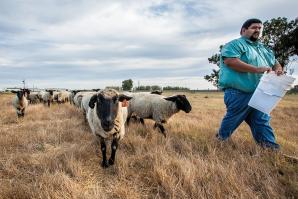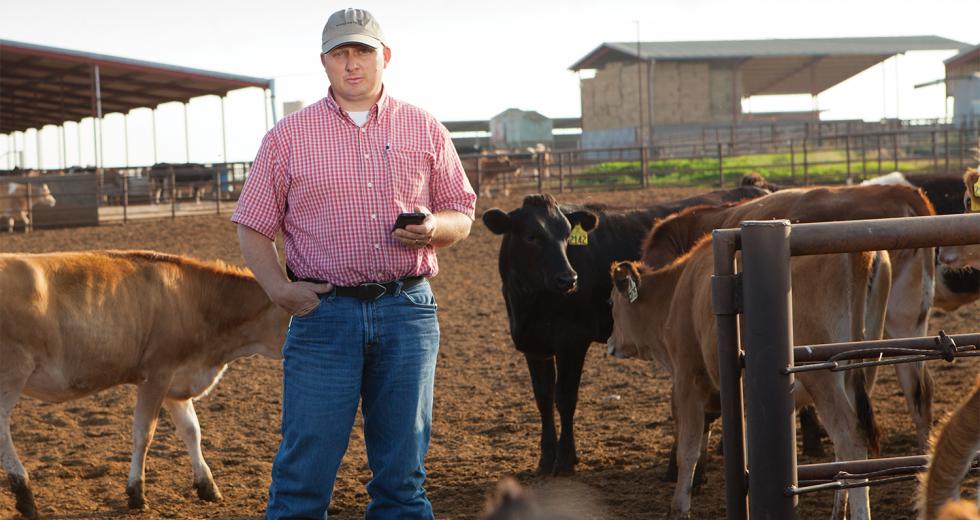“Good morning, Sacramento! It’s a perfect day for a pig roast. Come out and join us,” hog farmer Perrin Clark tweeted on a long-awaited day in May.
In Elk Grove, Clark’s family-run Jubilee Farm held its first pig roast at a site shared with the Oak Park Farmers Market. Throughout the morning, Clark posted pictures of Chef Brad Cecchi of Grange restaurant stuffing the porker and securing it onto the spit.
“Guess what’s inside?” he teased.
Later, after reading a tweet from a fellow hog farmer who said the deciding factor for his recent purchase of a Honda Crosstour was that it could fit four whole hogs with the seats down, Clark quipped, “Only a pig farmer!”
Social media is helping connect farmers with customers — and customers with their food — in a way that has been unseen amid the detaching effects of urbanization.
Farmers are turning to Twitter, Facebook, Instagram, Pinterest and other social media sites to share with customers the milestones in the lives and lifecycles of their livestock and produce, such as when berries are ready to be picked or when a grass-fed Angus steer has been slaughtered.
Agriculturalists also claim that, in addition to its use as a marketing tool, digital communication enables them to spread facts and restore public support for the American farmer, an iconic image of popular culture that has been under fire in recent years by advocates for human health and animal rights.
“Farmers and ranchers realize more and more the importance of being connected to consumers,” says Sharlene Garcia, an account manager at the agricultural marketing firm AdFarm, which created and operates the website KnowACaliforniaFarmer.com. “People are craving that connection to who’s providing their food, and now with social media, it’s becoming easier.”
Backed by the California Agricultural Communications Coalition, the site provides a platform for farmers to tell their stories using blogs, videos and photos they post themselves. Visitors can also comment, ask questions and “reconnect with the people who grow their food, flowers and fiber,” according to the website.
Garcia says the one-year-old site is in the initial phase of building content but has so far recorded 44,000 unique views. Additional funding would enable the next phase of efforts to multiply the number of website visits, Garcia says.
Ray Prock Jr. of Modesto joined early on. The second-generation dairy farmer says social media starts conversations with strangers that have turned into real-life friendships.
He blogs and tweets regularly to answer readers’ questions about how his staff of seven care for their 500 cows, the products he gives his animals and the diseases he treats. Prock also explains how he limits the amount of fertilizer placed into the ground so as not to pass excessive amounts onto his livestock.
“If I’m not out there talking about what I’m doing, someone else can tell my story for me. That’s how I learned I need to speak for myself.”
Ray Prock Jr., dairy farmer
That’s one of many issues that popular advocacy documentaries have highlighted to the general public in recent years. Movies like “Food, Inc.” and best-selling books from Barbara Kingsolver, Michael Pollan and Eric Schlosser target America’s industrialized agriculture practices — which can include vast feedlots, tiny cages and widespread use of antibiotics — as a way to explain the nation’s growing health problems.
In California, public opinion of the agriculture industry fell
again in 2008 when voters overwhelmingly passed Proposition 2, a
ballot measure that outlawed confining hens, pigs and calves in
cages so small that the animals are unable to fully extend their
limbs.
One of the key initiatives of the agriculture coalition’s online campaign is to foster a more supportive climate for California farmers. That goal is echoed by organizations like Illinois-based Dairy Management Inc., grassroots efforts like AgChat Foundation, and the recently formed U.S. Farming and Ranching Alliance, the biggest agricultural trade group in the country.
Prock’s interest in online communication led him to become chair of Dairy Management Inc.’s social media committee. He is ambivalent about the recent public awareness about food.
“A lot of the food documentaries raised good questions about how we farmers do things and have spurred the conversation,” Prock says. “Sometimes they’re sensationalized a bit and cause more emotion than necessary, and I watched several of them and noticed some inconsistencies in some of them. But as time has gone by, I realize that if I’m not out there talking about what I’m doing, someone else can tell my story for me. That’s how I learned I need to speak for myself.”
He and others, especially staff at AgChat and AdFarm, regularly fan out to train farmers on social media technology in workshops, hold online webinars and send out weekly emails with tips.
Academic researchers are involved as well. At UC Davis, Animal Science Professor Annie J. King and Viticultural Extension Specialist Matthew Fidelibus helped organize a conference on new media two years ago. Though they will sometimes give informal trainings to farmers to demystify hashtags and other parlance of social media, Fidelibus says that’s not his main focus.
He studies the production of grapes and uses Twitter and Facebook to educate his followers, sharing a diverse range of information, from a snapshot of a woman with a distinctive manicure picking grapes to technical details on delayed dormant insecticide application.
“I went to see an insect infestation, took some pictures with my phone and tweeted them,” Fidelibus said. “By the time I got back to the office, I’d been retweeted by a trade magazine that blogged with my pictures and linked to information on how to control the insect. I’m almost crowdsourcing my extension work. It creates more value out of what we do.”
There are plenty of small wineries among his followers who otherwise use social media to promote and advertise their wines over the Internet. Pig farmer Perrin Clark built Jubilee Farm out of a petting zoo for his daughter in fewer than five years, making known to customers their motto (“growing clean food”) and chemical-free, hog-raising environment via Twitter before the farm even had a website.
As farmers grow comfortable operating in online communities, organizations are looking to take the next step. Some are seizing the opportunity to propel civil discourse and encourage political organization among farmers.
“We know people already know how to use the tools. Let’s do something to help them become productive once they know how to use the tools,” says Jeff Fowle, a third generation cattle rancher from Etna.
Two years ago, Fowle and Prock helped create the AgChat Foundation. In the past year, Fowle has stepped back from the nonprofit to use more of his energy for a new effort: justfarmers.biz. The goal, says Fowle, is “to help folks essentially learn how to have quality conversations through listening that would lead to quality outcomes.”
Fowle points to this summer’s volatile wildfires in the western United States, which caused tens of millions of dollars in damages, as an example of an issue that needs better communication to the public. Fowle asserts that the government, at the behest of environmental interest groups, is partially responsible for the fires because of logging regulations that created overly dense forests.
Fowle has been blogging on the topic and says that, rather than grandstanding on a soapbox, he is providing the personal and local perspective that could potentially lead to more meaningful conversation among policymakers.
“Most people in agriculture for the past decade or more have assumed strong defensive postures because we have been bombarded by regulations and accusations from individuals who don’t have the facts right,” Fowle says. “I don’t think there’s a silver bullet for the conversation gap. It’s going to take different techniques and strategies to move forward. It’s going to take all of us.”
Did you know?
A small, open-air classroom to facilitate youth and adult agricultural education broke ground last month at Soil Born Farms. The project, a collaboration between the farm and the Metro Chamber’s Leadership Sacramento class of 2012, will enable Soil Born Farms to expand its current offerings, including camps for children and community events, which run year-round. Soil Born will also be able to offer more classes and demonstrations to educate the community about how food is grown and how to prepare meals using local produce. The Leadership Sacramento class provided planning, designing and fundraising support for the construction of the space on Soil Born’s 40-acre American River Ranch site.
Recommended For You

Banking on Content Marketing
Community banks embrace new marketing strategies to supplement traditional advertising
Having just begun using social media in 2012, Safe Credit Union is relatively new to content marketing. But it hasn’t taken long for the company to discover the benefits of engaging online with its customers and potential consumers.

Rearing an Industry
How Solano County is cultivating its ag economy
Solano County is taking steps to develop a new agricultural hub that farmers and economists hope will someday house facilities to process raw ag products into purchasable commodities.



